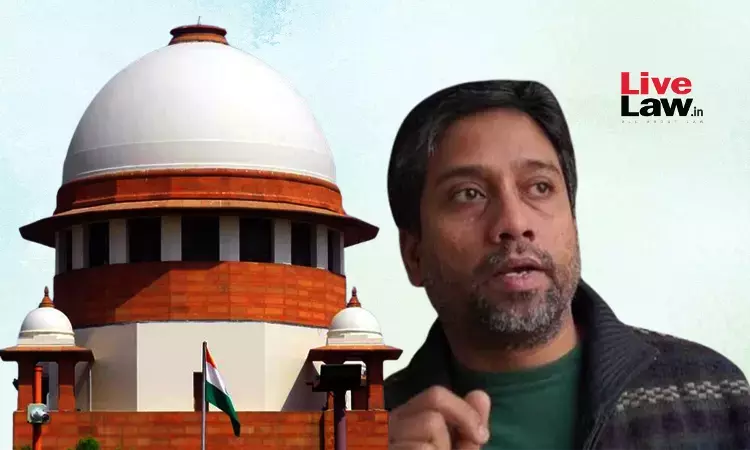- Home
- /
- Top Stories
- /
- Bhima Koregaon Case : Supreme Court...
Bhima Koregaon Case : Supreme Court Allows Hany Babu To Approach Trial Court Or HC, Or Revive Withdrawn SLP For Bail
Gursimran Kaur Bakshi
16 July 2025 1:38 PM IST
The Supreme Court today(July 16) granted liberty to former Delhi University Professor Hany Babu to approach either the trial court or the High Court seeking bail in the Bhima Koregaon-Elgar Parishad conspiracy case under the UAPA over alleged Maoist links.The Court also said that Babu could seek revival of his earlier Special Leave Petition filed in the Supreme Court, which was withdrawn.A...
The Supreme Court today(July 16) granted liberty to former Delhi University Professor Hany Babu to approach either the trial court or the High Court seeking bail in the Bhima Koregaon-Elgar Parishad conspiracy case under the UAPA over alleged Maoist links.
The Court also said that Babu could seek revival of his earlier Special Leave Petition filed in the Supreme Court, which was withdrawn.
A bench comprising Justice Pankaj Mithal and Justice PB Varale, granted this liberty to the petitioner while dismissing a Miscellaneous Application filed by him seeking a clarification that his earlier withdrawal of the SLP did not prevent the High Court from hearing his bail matter.
In September 2022, the High Court had denied bail to Babu, who was arrested in July 2020 by the NIA under the UAPA over alleged links to Maoists in the Bhima Koregaon case. In May 2024, he withdrew the special leave petition filed in the Supreme Court, saying that he wanted to approach the High Court for bail, citing a change in circumstances.
On May 2, the High Court observed that the Supreme Court's order allowing the withdrawal did not reserve his liberty to approach the High Court. Hence, the High Court said that Babu was required to seek clarification from the Supreme Court.
When the matter was taken up today, Advocate Payoshi Roy, appearing for Hany Babu, submitted that he has spent five years as an undertrial and had withdrawn the SLP to approach the high court because eight other accused persons were granted bail on grounds of prolonged incarceration, etc. She added that in comparison to these accused, the petitioner is better placed.
The Bombay High Court has so far granted bail to Rona Wilson and activist Sudhir Dhawale, Sudha Bharadwaj, while the Supreme Court has granted bail to P Varavara Rao on medical grounds, Shoma Sen, Vernon Gonsalves and Arun Ferreira on merits.
However, the Counsel, for NIA, opposed the plea and submitted that the MA is not maintainable because the fresh bail petition lies before the NIA Court. Since UAPA charges are involved, the high court sits as a court of appeal. He said: "This is an interim bail couched as an MA"
It should be noted that the trial court had rejected the bail application against which the petitioner had approached the Bombay High Court, which also denied bail to the petitioner. Against which, the petitioner had approached the Supreme Court but later withdrew the SLP.
Justice Mithal suggested that the petitioner approach the trial court: "Your primary ground is, some other accused has been granted bail, that can also be considered by the trial court."
Responding to this, Roy submitted that this ground can't be considered by trial court because the high court granted bail relying on judgments like K.A. Najeeb, which allows constitutional courts to grant bail even against the embargo of Section 43D(5) of UAPA if right to speedy trial is being violated. She said: "Section 43D(5) places certain restrictions on the court from granting bail. However, this court in Najeeb and other judgments had said that this despite the restrictions of UAPA, the courts exercising constitutional jurisdictions on grounds of delayed trial and violation of Article 21 can grant bail and ignore the 43D(5)."
Justice Mithal stated that, indeed, the constitutional courts can grant bail, but he added: "But can we direct the high court to consider a matter which does not lie before it?"
He further added that the grounds invoked by the petitioner are that seeking parity with other co-accused and not the ground of delayed trial.
Hearing nothing further, the Court passed an order: "The miscellaneous application is dismissed, leaving it open to seek remedies either before the trial court or the high court or seek revival of the SLP."
Case Title: HANY BABU v. NATIONAL INVESTIGATION AGENCY AND ANR|MA 1208/2025 in SLP(Crl) No. 1596/2024
Click Here To Read/Download Order



